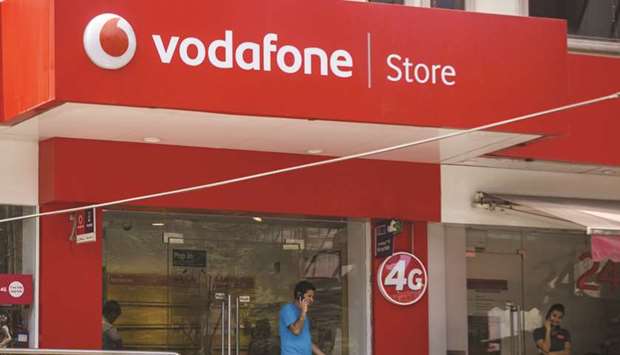Franklin Templeton Asset Management (India) Pvt marked down its debt exposure to Vodafone Group Plc’s India venture to zero, concerned by the operator having to pay $4bn in back-fees as early as next week.
The carrier’s shares suffered a record plunge.
The payment deadline has led to “significant uncertainty with respect to our exposure” to the carrier, the fund house said in a statement on Friday.
Shares of Vodafone Idea tumbled as much as 39%, reflecting concerns over the future of the beleaguered company.
Local wireless operators including Vodafone Idea Ltd and Bharti Airtel Ltd suffered a blow Thursday, when the Supreme Court rejected their appeal against an October verdict requiring them to pay as much as $13bn for spectrum and license fees.
The companies were counting on some relief, such as a reversal of the earlier order, reduced liabilities or staggered payment.
The court’s rebuff adds to the woes of India’s debt funds hit by a lingering shadow banking crisis that’s shaken the nation’s credit markets in the past 18 months.
The order also puts a severe burden on the survivors of a tariff war sparked by the 2016 entry of billionaire Mukesh Ambani’s Reliance Jio Infocomm Ltd, an upstart that disrupted the industry with free calls and cheap data.
Both Bharti Airtel and Vodafone Idea, with a combined net debt of about $30bn, reported record losses in the September quarter.
“Experience in India suggests it is unwise to talk of uncertainties, but it is very hard to see how Vodafone Idea survives,” analysts at New Street Research LLP wrote in a report. “A 2-player outcome would therefore be by far the most likely outcome,” which is positive for Bharti, they said.
While Bharti Airtel, run by tycoon Sunil Mittal, has managed to raise the $3bn it needs to pay from a sale of shares and convertible bonds, Vodafone Idea’s billionaire chairman Kumar Mangalam Birla has warned that the company may have to cease operations and file for insolvency if the government doesn’t ease their burden.
Vodafone Group, the British carrier that owns 45% of the venture, wrote off the carrying value of its shares in Vodafone Idea in its earnings for the half-year through September after analysts flagged the possibility of further impairments.
India is open to discussing ways to help ease the payment of these dues by wireless carriers, according to a government official with knowledge of the matter.
Stripping out interest from the dues or paying the amount in tranches are some ideas that the government can discuss, this official said.
Shares of Bharti Airtel climbed 5.5% at close on Friday in Mumbai after the court order raised the prospects of a telecom duopoly in India.
The company’s perpetual, dollar-denominated bonds declined the most in more than two months.
The court on Thursday also rejected requests by telecom companies for rehearing the petition seeking relaxations on penalties sought by the government and deadline for the payment.
“We wonder how weaker operators like Vodafone Idea will make this payment, and not that Bharti Airtel is getting any respite as the amount has to be paid up,” said Gaurang Shah, vice president at Geojit Financial Services Ltd. “It isn’t easy to raise tariffs and retain customers.
It remains to be seen how companies now respond to this decision because the court has twice spelled it out for them.”
For two decades, the operators had challenged the way authorities calculated their annual adjusted gross revenue, a share of which is paid as license and spectrum fees.
With the October ruling, the court upheld the government’s method, while rejecting the companies’ plea to exclude revenue from non-telecommunications businesses.
“We are evaluating filing a curative petition,” Airtel said in a statement after the ruling, an option echoed by Vodafone Idea as well. “The industry continues to face severe financial stress and the outcome could further erode the viability of the sector as a whole.”

Customers talk on mobile phones outside a Vodafone India store in New Delhi. Franklin Templeton Asset Management (India) marked down its debt exposure to Vodafone Group’s India venture to zero, concerned by the operator having to pay $4bn in back-fees as early as next week.
